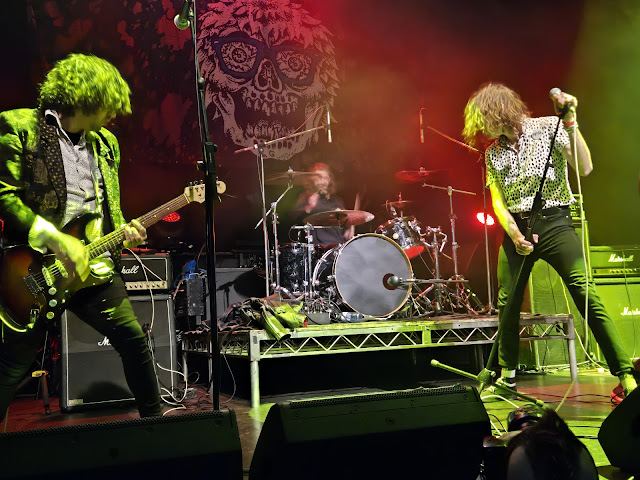If you push me hard enough to pin down a favourite movie, I'll probably end up at William Friedkin's Sorcerer, screening this weekend at the Cinematheque (and once more on February 17th). There are other contenders -- Clear Cut for its rage, honesty, potency, and fearlessness; Phase IV for its artful WTF-did-I-just-see weirdness ("now even weirder" with the preview cut on blu); Love Streams for its bravura ineffability (like, when the dog shows up, in human form, and Cassavetes is laughing, deranged on the couch: "Who the fuck are you?" And it's never explained). But Sorcerer has scenes of such intensity it will make you sweat.
I mean, look at that fuckin' poster. That's not just something they're faking; it's a real scene in the film. There's a truck on a rope bridge. There's a person on that bridge. The one time I had the Rebel Spell over for lunch, feeding the band before Adstock Maple Ridge, I remember that this poster was up in my kitchen and it caught Todd's eye and I highly recommended the film, but I doubt he ever saw it (it was less than a year before he died). And the thing about that poster is -- I mean, sorry, Mr. Herzog, but Friedkin takes the prize, here, for macho bravura filmmaking, five years before Fitzcarraldo: That's a real rope bridge, over a real river, and that's a real truck, and they're really doing this insane thing, and they're doing it in a vastly less self-impressed way (Sorcerer >>>>>> Fitzcarraldo a hundredfold), with no acolyte on hand to document it... (I like Herzog too, but prefer him when his characters are smaller-than-life, as in Stroszek, another of those shortlist films).
Plus you've got to love that the year Sorcerer came out, Star Wars was the big hit and everyone pretty much ignored the other film, pissed off because it wasn't The Exorcist again (David M. has opined that the occultish title of Sorcerer was what sunk it, because people wanted "more Exorcist" and it sure isn't that; he may be right, but it's still a hilarious testament to the stupidity of the masses that they could somehow miss this film). For literal decades, between 1977 and 2013, Sorcerer existed in obscurity, Friedkin licking his wounds, his masterpiece ignored: the only way you could get it on home video was as a crap pan-and-scan full frame VHS, then a crap pan-and-scan full frame DVD, among the worst-looking home video releases ever. That's just hilarious: it's only the most intense, most vividly cinematic highbrow existentialist action thriller ever made, and people missed it, didn't care, and persisted in that state for nearly forty years.
Nice that it eventually got re-evaluated, and in Friedkin's lifetime, too. Maybe I'll re-read the relevant chapter in his autobiography?
Sorcerer -- in its fully restored form -- plays twice this month at the Cinematheque and if you have never seen it on the big screen, you simply must. When it was re-released theatrically a few years ago, I caught it four or five times, but I'll probably go again for the second screening (feckin' Los Furios should be flattered as hell that I'm going to miss one screening of it, this Saturday, to see them at the Rickshaw, but you can raise a sweat by dancin', too). And for added punch, it's being screened with The Wages of Fear, the film it's an adaptation of; truly ambitious, athletic -- hell, truly masochistic -- cinephiles have a chance to catch them back to back both this weekend, and on Monday the 17th.
I like Sorcerer more than Wages, but I've only ever seen Wages once (!).
Kinda akin to Treasure of the Sierra Madre, both films deal with desperate people who team up to try to dig their way out of a hole in a depressed Latin American country. Like that film, they go on a transformative journey, from which (not much of a spoiler, really, but...) not all of them will return. But that film -- Treasure, not Wages -- leaves you laughing, is in a backhanded way kind of uplifting, whereas Sorcerer -- I wonder if, like, Jean Paul Sartre ever saw it? Nietzsche obviously didn't, and (I pause to look up when Camus died) neither did Camus. If I knew my existentialists well enough, I'd be able to say whose sense of life is best captured here, but the ending of Sorcerer is... well, grim to say the least, even though, y'know, there is some dancing there, too.
Dancing is important.
Note: I had some outtakes from that Los Furios thing I did for Montecristo that I considered posting but in fact I think I want to focus on some other stuff this weekend: the Montecristo article was real fun, and their show afterwards was great (they dedicated "Revolution Rock" to me!) but it can stand on its own, though I'm happy the band has reconvened now that their new album is finally out to play again (they talked about how the album was more punk than ska but it's still pretty ska by me). And the Vanrays and Paul Pigat... holy shit! Not a gig you want to miss (unless it's to see Sorcerer...).
PS. Hey, look, there's a Netflix remake of The Wages of Fear that is almost completely unrecognizeable! Does it get good? It hasn't yet, but I only held out for half an hour or so.






















































